- Home
- Diana Wynne Jones
Aunt Maria Page 5
Aunt Maria Read online
Page 5
“I just said it to frighten you,” said Chris. “The result was spectacular. Get some of that mud off. Aunt Maria will be telling everyone we’re drowned and Elaine will be giving Mum hell for letting Auntie get so worried.”
Now I’m writing it down, I can see Chris was lying to make me feel better. I didn’t realize then, and I did feel better. I stood on one leg and took my shoes off in turn and scraped them on the iron fence. Chris scraped his a bit, but he wasn’t anything like as muddy. He had looked where he was going.
While we were doing it, the train had stopped and all the people from it began to come out of the station. They came one after another along past the fence under the light. They didn’t look at us. They were all staring straight ahead and walking in the same brisk way, looking kind of dull and tired. “Rush-hour crowd,” Chris said. “Funny to have it out here, too. I wonder where they all commute to.”
“They look like zombies,” I said. Most of them were men and they mostly wore city suits. About half the line marched out through the gate at the end of the car park. We could hear their feet marching twunka twunka twunka down the road into Cranbury. The other half, in the same unseeing way, walked to cars in the car park. The space was suddenly full of headlights coming on and starters whining. “Zombies tired after work,” I said.
“All the husbands of the Mrs. Urs,” said Chris. “The Mrs. Urs take their souls away and then send them out as zombies to earn money.”
“But the Mr. Urs don’t realize,” I said. “They’ve all been zombies for years without anyone knowing.” The cars were all zooming out of the car park by then, crunchle crunchle as they came past us on the gravel, flaring headlights over us. The zombies in each car looked straight ahead and didn’t notice us staring over the fence. Car after car. It was giving me a mesmerized feeling, until one crunched by that was blue, with one headlight dimmer than the other and dents in well-known places. “Hey!” I cried out. I hung on to the fence so that my hands hurt. “Chris, that was—!”
“No, it wasn’t,” Chris said. He was hanging on the fence, too. “It had the wrong number. I thought it was our car, too, for a moment, but it wasn’t, Mig. Truly.”
You can rely on Chris where numbers are concerned. He’s always right. “It was awfully like ours,” I said.
“Creepily like,” Chris agreed. “I really did wonder if they’d dried it out and mended the door and sold it to someone—for a second, till I looked at the number plate. The number plate always goes with the car. It’s a crime to change it—so it has to be a different car.”
By the time all the cars had driven away, the porter in seaboots was padding about in front of the station, closing it for the night by the look of it. We climbed over the fence and trotted out through the car park gates.
“We’d better not tell Mum,” I said.
“No,” said Chris. “We can tell her we’ve seen clones and zombies, but not about the car.”
In the end, we didn’t tell Mum anything much. We were in trouble—both of us for being so late and me about the state my clothes were in. Aunt Maria was really put out about my clothes. “So thoughtless, dear. I can’t take you to the meeting looking like that.”
“I thought your meeting was this afternoon,” Chris said.
Mum shushed him. She was in a frenzy. The Mrs. Urs had been there all afternoon having their Circle of Healing and wolfing cake, and now Aunt Maria had announced that there was a meeting at Cranbury Town Hall she had to go to at seven-thirty. That is the reason I have been able to write so much of this autobiography. I have been left behind in disgrace because I have got my only skirt torn and covered in mud. I like being in disgrace. There is still some cake left. Aunt Maria used her low sorrowing voice on me and then told Chris he had to go instead. Mum took one look at Chris’s face and martyred herself again by saying she would go with Aunt Maria.
I can’t think why Aunt Maria needs Mum. When zero hour approached, Elaine and her husband came round with the famous wheelchair. Mr. Elaine—who is called Larry—is smaller than Elaine and I think he was one of the line of zombies who got off the train. Anyway he has a pale, drained, zombie-ish look and does everything Elaine says. The two of them unfolded the vast, shiny wheelchair in the kitchen and heaved Aunt Maria into it. Chris had to go away and laugh. He says Aunt Maria looked like the Female Pope. At zero hour minus one, Aunt Maria had made Mum array her in a large purple coat, with most of a dead fox round her neck. The fox’s head is very real, with red glass eyes, and it spoiled my supper, because Aunt Maria had supper in it in case they were late. And her hat, which is tall and thin with purple feathers. The wheelchair looked like a throne when she was in it. She kept snapping commands.
“Betty, my umbrella, don’t forget my gloves. Larry, mind the rug in the hall. Be careful down the steps.”
And Elaine always answered for Larry. “Don’t worry. Larry’s got it in hand. Larry can do your steps blindfold.” Larry never said a thing. He looked at me and Chris as if he didn’t like us. Then he and Mum and Elaine took Aunt Maria bumping down the front steps and wheeled her off down the street like a small royal procession.
The meeting was about Cranbury Orphanage. It turns out that the house where we saw Mrs. Ur and the clones—and the ghost—is Cranbury Orphanage. How dull. It makes the whole day seem dull now, if they were only orphans, not experimental clones after all.
Mum thought the meeting was pretty dull, too. When I asked her about it just now, she said, “I don’t know, cherub. I was asleep for most of it—but I think they were voting on whether or not to build an extension to the orphanage. I remember a dreary old buffer called Nathaniel Phelps was dead against it. He talked for ages, until Aunt Maria suddenly banged her umbrella on the floor and said of course they were going to build the poor orphans a new playroom. That seemed to settle it.”
I think Aunt Maria is secretly Queen of Cranbury—not exactly Uncrowned Queen, more like Hatted Queen. I am glad I am not an orphan in that orphanage.
Four
We are feeding the gray cat now. Something very odd has turned up because of that, and we have met Miss Phelps who said things. Chris says the ghost comes every night. But I’ll tell it in order.
Ghost first. I ask Chris about him every morning. Chris laughs and says, “Poor old Abel Silver! I’m used to him by now.” I said yesterday why didn’t Chris sleep on the sofa downstairs instead? He was looking tired. I know how I’d feel if I was woken by a ghost every night. But Chris says he likes the ghost. “He just searches the shelves. He’s not doing me any harm.”
It was after that that the cat turned up at the window again. It came and put its silly flat gray face up against the glass and mewed desperately. Chris said it looked like a Pekinese. Aunt Maria was banging away upstairs, shouting that her toast was wrong, and Mum was flying through the room to see to it. But she stopped when she saw the cat.
“Poor thing!” she said. “Not a Pekinese, Chris. It reminds me of something … someone … that face…” There were more bangs and shouts from upstairs. Mum shouted, “Coming!” and she was just leaving when Chris put on an imitation of Aunt Maria.
“He’s eating my birds!” Chris shouted. He jumped up and flailed his arms at the cat the way Aunt Maria does. The cat stared. It looked really hurt. Then it ran away.
Mum and I both said, “What did you do that for?” While I was making more toast for Aunt Maria, Chris said he was sorry, he couldn’t resist, somehow. The cat sort of asked for it. I know what he means. But Mum got really indignant.
She went looking for the cat after we’d got Aunt Maria dressed—which takes ages now, because Mum keeps trying to make Aunt Maria do something for herself. She says, “Your hands aren’t the least arthritic, Auntie. Try doing up these hooks.” Aunt Maria pretends to fumble for a bit and then says in a low sighing voice, “I’m old.” Mum says, “Yes, but marvelous for your age!” in a special cheerful voice. Aunt Maria beams, “Thank you, dear. How kind! What a devoted nurse you are!”
And I end up doing the hooks, or whatever, or she wouldn’t be dressed by evening.
That day was fine. The sun came sideways across the garden and seemed to bring green in among the brown of it for a change. Mum put her radio on the table beside Aunt Maria’s roped-up sofa and firmly put the Telegraph on Aunt Maria’s lap and told her we were all going to be busy in the garden.
Aunt Maria of course said, “I have so few people to talk to, dear!” and Chris of course muttered, “Yes, only thirteen Mrs. Urs,” but Mum tore them apart and bundled us into the garden. I really thought the worm had turned and Mum had had enough of being martyred. But Mum never lies. She had me and Chris hanging up washing like mad in no time—all the clothes we’d got muddy in the dark and a whole row of Aunt Maria’s sky-blue, baggy knickers that Chris calls “Auntie’s Baghdads.”
While we did that, Mum said, “Now I’m going to find that cat. It didn’t go far.”
She did find it, too. She called to us gently from the shed at the back behind the gooseberry bushes. Chris and I were doing an Arabic dance at the time, with the washing bowl and a pair of Baghdads. Chris still had the Baghdads on his head when we went over. He saw the gooseberry bushes and said, “That’s where the orphans are cloned from!” The ghost and Aunt Maria between them have a bad effect on Chris. He’s never sane now unless he’s out in the town.
“Hush!” Mum said, and stood up holding the gray fluffy cat. “Chris, you look an utter ass! This poor beast is starving. She’s skin and bone under this fluff!”
“She?” I said.
“Yes, it’s a female,” Mum said, and she tipped the cat upside down in her arms to show us. That cat is soppy. She lets you do anything with her. She lay on her back in Mum’s arms, bending her front paws about and purring like a heavy motorbike. The only things she doesn’t like are Aunt Maria and Elaine. Elaine put her head over the garden wall at that moment. That cat heaved out of Mum’s arms and hid in the gooseberry bushes. Elaine didn’t see it. She was staring at Chris with a pair of the Baghdads on his head, uttering her most clock-striking laugh.
“Good Lord, my lad!” she said. “You look like a ghostly court jester!” Chris went a little pale at that and stared, rather. But Elaine looked at Mum then. “You shouldn’t do any washing,” she said. “I told you to give it to me.”
“Oh, that’s all right,” Mum said. “Mig got herself so muddy it had to be done by hand.” Meaning, she is not going to let Elaine do her any favors.
“Be sure you give me the next lot then,” Elaine commanded. Two-line smile, meaning This Is an Order. “I’m coming in this afternoon to sit with her while you’re out.”
“Oh? Am I going out?” Mum asked sweetly.
“You’ve got to buy Naomi more clothes,” Elaine said, and bobbed out of sight behind the wall.
“So I have!” murmured Mum. “Mig, how would you like a sack with holes in it?”
“She could manage with that hall rug,” Chris said, “that we have to roll up every night.”
“Yes, if I cut a hole in it for my head,” I said.
Mum bent down and held out her arms coaxingly to the cat. “Disobey Elaine!” she said. “Good heavens! She’d beat us insensible with her torch. Or if we really annoyed her, she might even set Larry onto us.” I’ve never heard Mum be so catty, not ever!
Talking of cats, the cat came leaping into Mum’s arms, and it was starving. It ate two raw hamburgers and drank a bowl of milk in three minutes flat. The first thing Mum did when we were out that afternoon was to buy a whole cardboard box full of cat food. She’s talking of taking the cat back to London with us. She says it’s so affectionate. She keeps saying, “I can’t think how it comes to be a stray! I thought gray Persians were rather valuable.” She also sits it on the drain board and spends long ages rubbing the sides of its flat whiskery face. “Kutchi-wutchi-wutchi,” she murmurs, staring deep into its glassy yellow eyes. “You do remind me of someone, but I can’t think who!”
It’s a terribly boring cat. About as interesting as a floppy cushion. But Chris and I look after it almost as eagerly as Mum does. We all know we’re defying Elaine and Aunt Maria.
But of course we obeyed Elaine by going shopping for a new skirt for me. I wish Mum had defied Aunt Maria and let Chris come, too. But Aunt Maria did her soulful low booming voice and said, “My friends love to see young people,” so Chris had to stay and help Elaine cut sandwiches. His face looked as if he was imagining cutting bread as sawing slowly through one of Aunt Maria’s legs.
It was still beautifully sunny, with almost no wind. The sea was blue-gray and the tide was out. You’d have thought there would be somebody down on the sand at least, but Cranbury was like a ghost town. Not a soul was about.
“Perhaps it’s early-closing day,” Mum said.
But it wasn’t. The shops were open. Mum went sailing down the street with her load of cat food, talking in her merriest, most ringing way. “What an odd place this is,” she said. “There don’t seem to be any children.” The lace curtains all along the street jerked. I thought, except the clones, and walked a long way behind trying to look as if I didn’t belong to Mum. When she’s in that kind of mood she can be worse than Chris. It was Elaine’s fault she was.
Sure enough, Mum fell into a long conversation in the clothes shop with the lady there, all about how quiet Cranbury was. I could see the lady was embarrassed from the awkward way she said, “Well, there’s a lot of retired people live here, you know.”
“And no children at all?” Mum said. “There must be. You sell children’s clothes.”
“We don’t get much call for them,” the lady admitted, “except from tourists like yourself.”
Then Mum explained at great embarrassing length that we were staying with Aunt Maria. I wish she wouldn’t. I do think people ought to be more mysterious about themselves. And the lady got eager and sympathetic and kept saying, “Difficult to live with, is she?” in a way that was obviously fishing. So then Mum told her about the time when Aunt Marion was alive, and not on speaking terms with Aunt Maria. They both insisted we should see them, but they would not admit the other one existed. So that whenever we visited Cranbury we had to have tea twice, once with Aunt Marion and once with Aunt Maria. I remember it hideously. I was always sick on the way home.
The lady laughed and said, “Yes, she’s always been like that. Miss Phelps is the latest. I feel sorry for Miss Phelps. Your auntie’s friend Elaine used to do a lot for Miss Phelps—take her out in a wheelchair and so on—but since Miss Phelps and your auntie had words, I heard Mrs. Blackwell’s been under orders not to do anything for her anymore.”
Then Mum got an attack of crusading zeal and asked the lady ringingly if Miss Phelps would appreciate a visit from us. And the lady said, “Yes. Number twelve, she is, just across the road from you.” Really, it is difficult having a martyred crusading saint for a mother sometimes. She forgot my skirt and had to go back for it. She only remembered when we’d walked right to the other end of town. Mum said it was such a fine day that she would let Elaine get on with the Mrs. Urs and get a bit of fresh air for a change. So we humped the cat food along the seafront, until we came to the concrete slope with the little boats pulled up on it. That was the first time we saw anyone. There were four or five men in big boots pottering about the boats.
“Ah! A rare sighting of the endangered human species,” Mum said, and called out, “Good afternoon!” very loudly. Only two of the men looked up and only one nodded. “What a hole this is!” Mum said. I saw her notice the cliff under Cranbury Head and look away quickly. “I never did find out what caused the row between Aunt Marion and Aunt Maria,” she said, with dreadful merriness. “I wonder what Miss Phelps said to her.” Then she remembered my skirt. First she said I could run and get it. Then she saw my face and relented. “I left it,” she said. “I’ll go back for it. You take the cat food and wait in the main square. I seem to remember this picturesque little dump has a café there. I’ll buy you an ice cream
before we go back to the workhouse.”
Which shows that Mum is a fairly human saint. But cat food weighs a ton. When I got to the main square I put it on the steps of the war memorial and wandered about. The café was shut. Of course. So I went down the street Mum was most likely to come to the square by so that I could wave and save her the journey when I saw her. And instead I saw a car parked by the drugstore. It was a blue car with well-known dents—the one we saw at the station the other night. It looked so like our old car that my heart began to bump and hammer in my throat, even though I could see its number plate. Ours had been a Y-registration. This was an H, and its number plate was all old and rusty. But it was the same kind of Ford, the same color exactly. I found myself thinking, I’ll just go round on to the pavement and see if the dents in the driver’s door are there. Dad had kicked it furiously the first time it stopped unlocking. And before I’d finished thinking that, I was round on the pavement, staring.
That door was quite smooth. It looked a slightly different color from the rest of the body. Its window was wound down and there was a blond lady sitting in the driver’s seat busy doing her face in one of those little handbag mirrors. I hadn’t seen her from behind because the car had high backs to the seats, like gravestones—just like ours again. She had a pouting mouth and cared-for dyed hair. In fact, she looked so exactly like I always imagined Verena Bland that Dad went away with, that the most awful suspicions went through my mind. My heart hammered even harder, and I went nearer—or I tried to. But I found I was sort of bending down, with a hand on each knee, in a most peculiar way. If you walk like that it’s even more peculiar. And I thought of spies using handbag mirrors and car mirrors to watch people in. I thought, She’s watching me in that mirror!
After that I was so terrified that she’d suspect my suspicions that I was forced to straighten up. I walked right up to the car window and I said, “Excuse me, miss.”
I tried to get a sniff of the inside of the car as I said it, to see if it smelled of seawater or the same old smell as always, but all I got was an absolute blast of the blond lady’s perfume. She turned her head with a jump. “Yes?” she said, surprised and unfriendly.

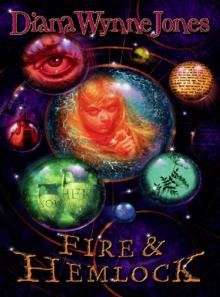 Fire and Hemlock
Fire and Hemlock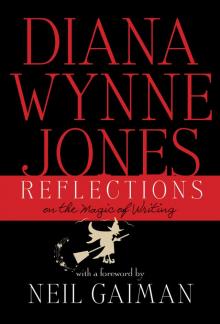 Reflections: On the Magic of Writing
Reflections: On the Magic of Writing The Game
The Game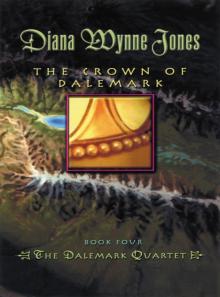 The Crown of Dalemark
The Crown of Dalemark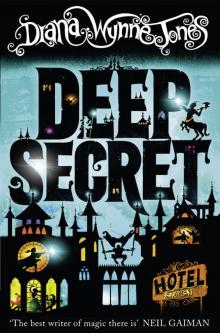 Deep Secret
Deep Secret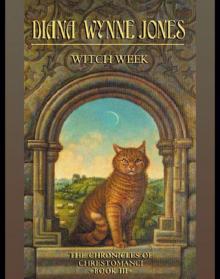 Witch Week
Witch Week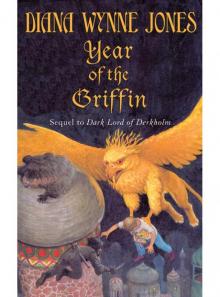 Year of the Griffin
Year of the Griffin Wild Robert
Wild Robert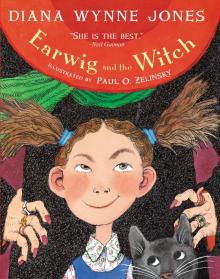 Earwig and the Witch
Earwig and the Witch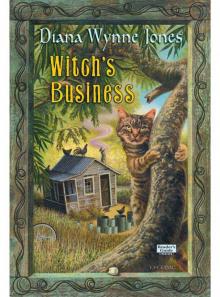 Witch's Business
Witch's Business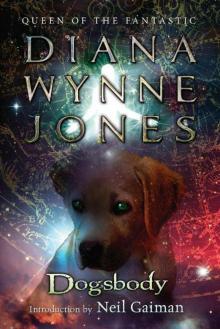 Dogsbody
Dogsbody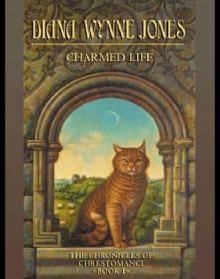 Caribbean Cruising
Caribbean Cruising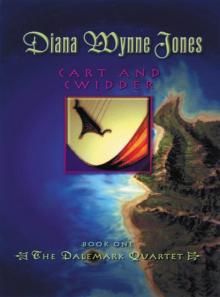 Cart and Cwidder
Cart and Cwidder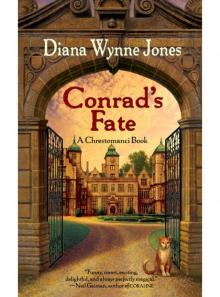 Conrad's Fate
Conrad's Fate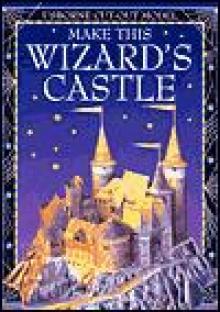 Howl's Moving Castle
Howl's Moving Castle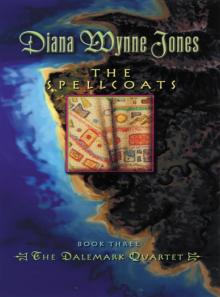 The Spellcoats
The Spellcoats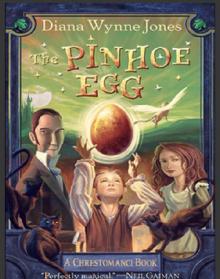 The Pinhoe Egg
The Pinhoe Egg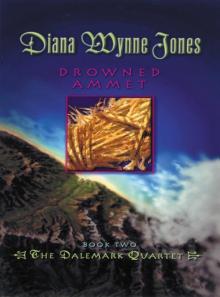 Drowned Ammet
Drowned Ammet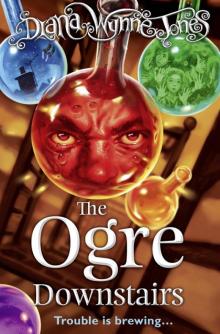 The Ogre Downstairs
The Ogre Downstairs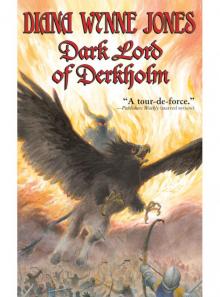 Dark Lord of Derkholm
Dark Lord of Derkholm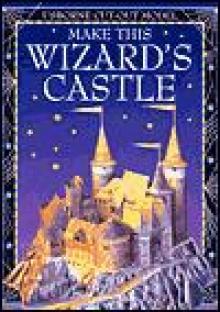 Castle in the Air
Castle in the Air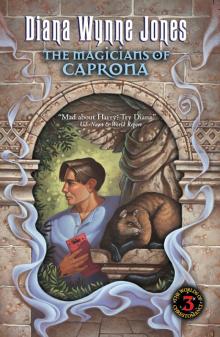 The Magicians of Caprona
The Magicians of Caprona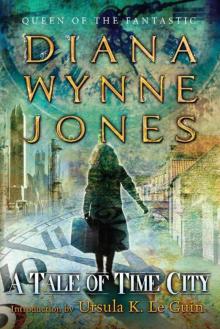 A Tale of Time City
A Tale of Time City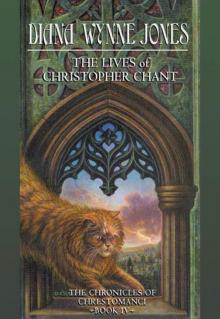 The Lives of Christopher Chant
The Lives of Christopher Chant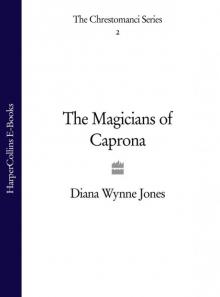 The Magicians of Caprona (UK)
The Magicians of Caprona (UK)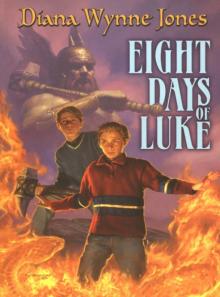 Eight Days of Luke
Eight Days of Luke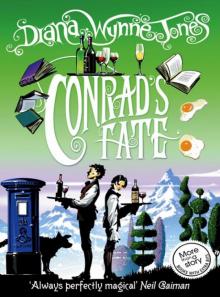 Conrad's Fate (UK)
Conrad's Fate (UK)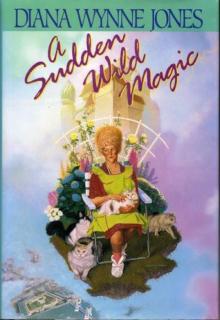 A Sudden Wild Magic
A Sudden Wild Magic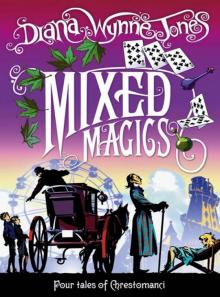 Mixed Magics (UK)
Mixed Magics (UK)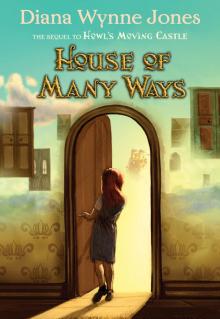 House of Many Ways
House of Many Ways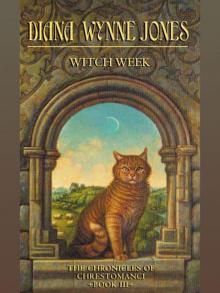 Witch Week (UK)
Witch Week (UK)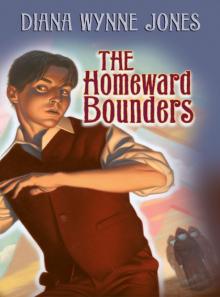 The Homeward Bounders
The Homeward Bounders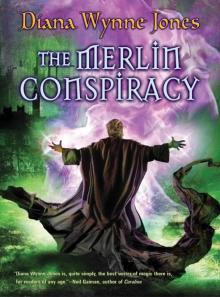 The Merlin Conspiracy
The Merlin Conspiracy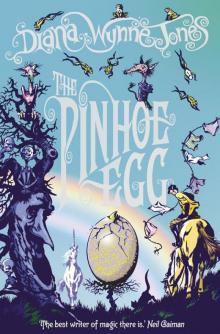 The Pinhoe Egg (UK)
The Pinhoe Egg (UK)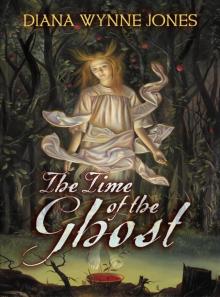 The Time of the Ghost
The Time of the Ghost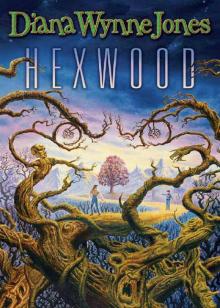 Hexwood
Hexwood Enchanted Glass
Enchanted Glass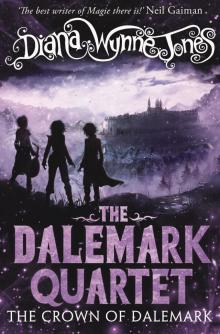 The Crown of Dalemark (UK)
The Crown of Dalemark (UK)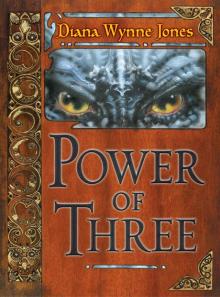 Power of Three
Power of Three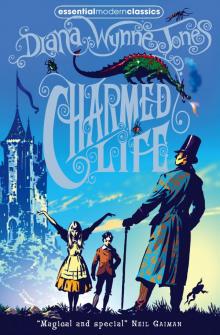 Charmed Life (UK)
Charmed Life (UK)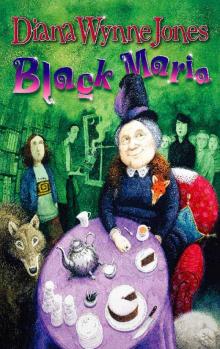 Black Maria
Black Maria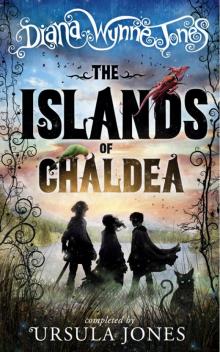 The Islands of Chaldea
The Islands of Chaldea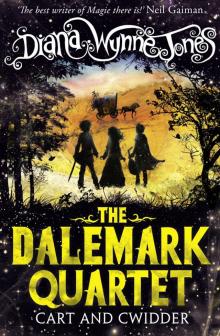 Cart and Cwidder (UK)
Cart and Cwidder (UK)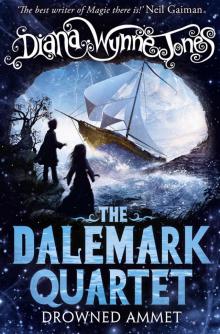 Drowned Ammet (UK)
Drowned Ammet (UK)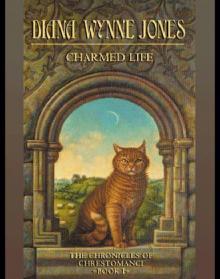 Charmed Life
Charmed Life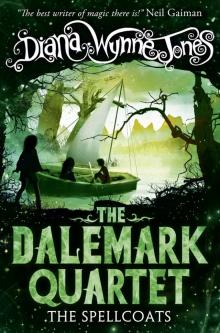 The Spellcoats (UK)
The Spellcoats (UK)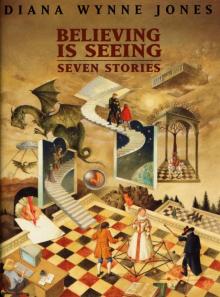 Believing Is Seeing
Believing Is Seeing Samantha's Diary
Samantha's Diary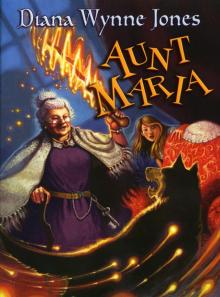 Aunt Maria
Aunt Maria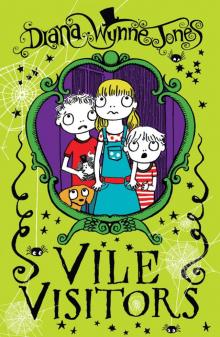 Vile Visitors
Vile Visitors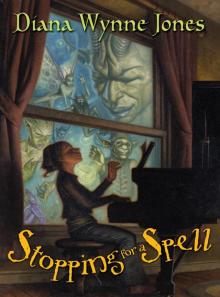 Stopping for a Spell
Stopping for a Spell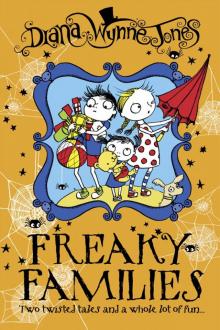 Freaky Families
Freaky Families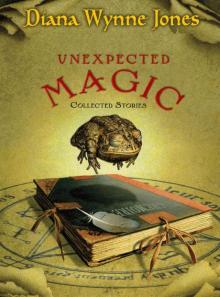 Unexpected Magic
Unexpected Magic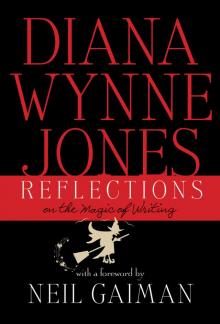 Reflections
Reflections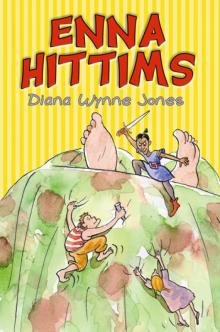 Enna Hittms
Enna Hittms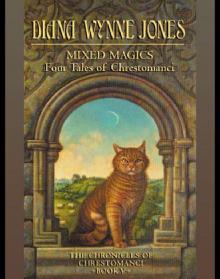 Mixed Magics: Four Tales of Chrestomanci
Mixed Magics: Four Tales of Chrestomanci